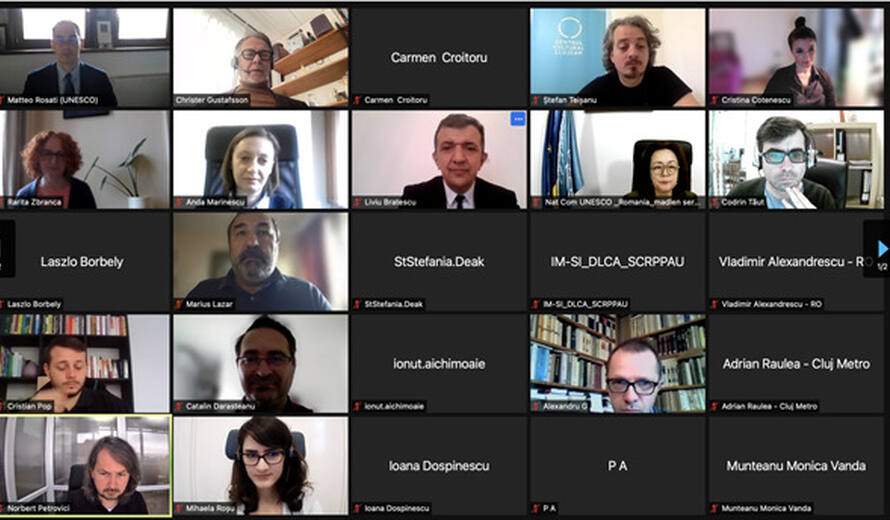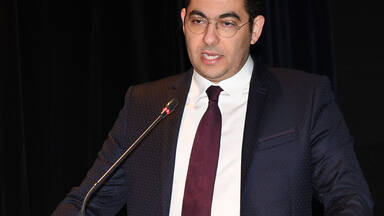Romania and city of Cluj-Napoca, Kick-Off workshop for the UNESCO Culture|2030 Indicators
The pilot implementation of the UNESCO Thematic Indicators for Culture in the 2030 Agenda (UNESCO Culture|2030 Indicators) has been launched in Romania and Cluj-Napoca. A kick-off workshop was organized by the Ministry of Culture and the National Institute for Cultural Research and Training and the City Hall of Cluj-Napoca and the Cluj Cultural Centre in close collaboration with UNESCO, on 6 December 2021. The workshop gathered 43 participants, including representatives and institutions from the national and local authorities, as well as civil society organizations, academics, the private sector, and other competent entities whose work is informed by culture and heritage.
In line with UNESCO’s commitment to advocate for the essential role of culture in sustainable development, the UNESCO Culture|2030 Indicators is a conceptual and methodological framework of thematic indicators whose purpose is to measure and monitor the progress of culture’s enabling contribution to the national and local implementation of the Goals and Targets of the UN 2030 Agenda for Sustainable Development.
The framework has been developed by UNESCO in collaboration with the UNESCO Institute for Statistics (UIS), with the aim to assess both culture’s role as a sector of activity, as well as the transversal contribution of culture across different SDGs and policy areas. The UNESCO Culture|2030 Indicators framework maps the SDGs in 22 indicators across four thematic dimensions: Environment & Resilience, Prosperity & Livelihood, Knowledge & Skills, and Inclusion & Participation. Goal 5 on ‘Gender equality’ is addressed transversally across the framework by allowing for the appreciation of sex disaggregation across a number of data points from access to opportunities and their participation in social, economic, political, and cultural life.
The UNESCO Culture|2030 Indicators’ methodology aims to make culture visible, provide a thematic overview, build messages and advocacy, inform national and local policies and actions, help understand trends and build knowledge, and monitor the global progress of culture in the realization of the UN 2030 Agenda for sustainable development.
The implementation of the UNESCO Culture|2030 Indicators in Romania and in the city of Cluj-Napoca was made possible thanks to the generous financial contribution of the European Union and the Swedish International Development Cooperation Agency (SIDA).
Mr. Ernesto Ottone R., the Assistant Director General of UNESCO for Culture, opened the workshop congratulating Romania and the city of Cluj-Napoca for launching the pilot implementation of the UNESCO Culture|2030 Indicators and highlighted UNESCO’s continued support of Member States in the implementation of national and local development programs through culture. He hailed the project as an innovative initiative to help decision-makers through building a solid and coherent discourse, based on concrete elements, on culture and development. He also addressed how these voluntary indicators contributed to informing the National Voluntary Reviews and Local Voluntary Reviews for countries and cities.
Ms. Jyoti Hosagrahar, Deputy Director of the UNESCO World Heritage Centre, shared an introduction to the UNESCO Culture|2030 Indicators framework. She explained the development of the methodology and its guiding principles as well as the major implementation steps at national and local levels. She also presented the framework ant its linkages with the UNESCO Cultural Conventions and the SDGs of the UN 2030 Agenda.
Mr. Liviu Brătescu, State Secretary, Ministry of Culture of Romania delivered the welcoming message for the workshop. He highlighted the value of the previous experience in implementing the Culture for Development Indicators Suite (CDIS) as this provided rich and valuable information and analysis. He expressed his confidence in the UNESCO Culture| 2030 Indicators “as an advocacy tool for culture as well as a driving force for better dialogue across various sectors and across different levels of governance”.
Mr. László Borbély, State Counselor, Department for Sustainable Development also delivered welcoming remarks, highlighting Romania’s cultural diversity as a case for adopting measures targeted at protecting, supporting, and developing culture. He stressed the importance of the UNESCO Culture| 2030 Indicators in providing data to guide future actions.
Mr. Ovidiu Cîmpean, the Director for Development at the Cluj-Napoca City Hall, delivered the welcoming message for the workshop on behalf of the city. He shared amongst other successes the inclusion of Cluj-Napoca in the network of UNESCO Creative Cities, as a Creative City of Film and expressed his optimism that the UNESCO Culture| 2030 Indicators will correlate the economic success of the city with its cultural projects.
Ms. Cristina Cotenescu, the National Expert for Romania presented an overview of national policies and share the experience of the previous implementation of the Culture for Development Indicators Suite (CDIS).
Mr. Christer Gustafsson, UNESCO Regional Expert, provided an overview of the project and the framework’s methodology, while the national and local experts presented the 22 indicators and the four dimensions focusing on data mapping, data collection, and the process of extracting raw data from international and national accounts.
During the workshop, the national and local implementation teams along with the UNESCO Regional Expert facilitated exchanges between participants and discussed the UNESCO Culture|2030 Indicators from various perspectives.
The workshop achieved its objective of introducing the UNESCO Culture|2030 Indicators framework methodology, bringing together key stakeholders and professionals whose work is informed by culture and heritage, and in this collaborative process, imparting knowledge to strengthen culture data collection and laying the groundwork for the formulation of policy recommendations for improved inclusion of culture in the national dialogue at the conclusion of the project.
The meeting was closed by Mr. Christer Gustafsson, UNESCO Regional Expert. He thanked all the participants, the national and local teams and especially the stakeholders for their presence, attendance and availability to start this collaborative work.
For further information on the UNESCO Culture|2030 Indicators project, we invite you to explore the following webpage: UNESCO Culture|2030 Indicators



